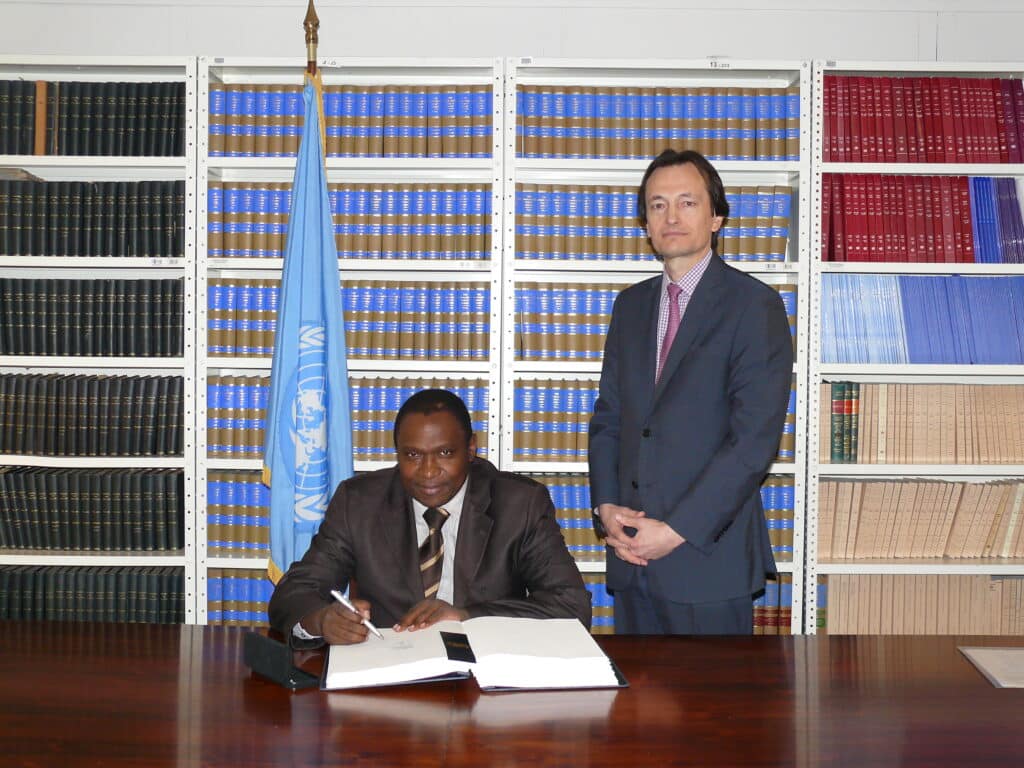General Information
After a treaty has been concluded, the written instruments, which provide formal evidence of consent to be bound, and also reservations and declarations, are placed in the custody of a depositary. Unless the treaty provides otherwise, the deposit of the instruments of ratification, acceptance, approval or accession establishes the consent of a state to be bound by the treaty. For treaties with a small number of parties, the depositary will usually be the government of the state on whose territory the treaty was signed. Sometimes various states are chosen as depositaries. Multilateral treaties usually designate an international organization or the Secretary-General of the United Nations as depositaries. The depositary must accept all notifications and documents related to the treaty, examine whether all formal requirements are met, deposit them, register the treaty and notify all relevant acts to the parties concerned.
EUCLID specific Information
Both EUCLID conventions designate the EUCLID Secretary-General as depositary. It shall be noticed that the initial convention used the spelling “depository” rather than “depositary” which is not an uncommon (albeit technically incorrect) variant. Most spell-checkers (such as the one used by WorPress to create this page) do not recognize the word “depositary” and will replace it with the more common form “depositary.” The Updated Framework Agreement used “depositary.”
The Role of Treaty Depositaries: A Guide Based on the Vienna Convention on the Law of Treaties (1969)
Introduction
In international law, treaties are foundational to establishing binding commitments between states or, in some cases, between states and international organizations. The Vienna Convention on the Law of Treaties (VCLT), adopted in 1969 and entered into force in 1980, codifies the rules governing treaties, including the critical role of the depositary—an entity tasked with managing the administrative and legal aspects of a treaty’s lifecycle. Often described as the “treaty on treaties,” the VCLT provides a comprehensive framework to ensure transparency, accuracy, and efficiency in treaty administration. This article explores the role of treaty depositaries, focusing on Article 76 (Depositaries of Treaties) and Article 77 (Functions of Depositaries) of the VCLT, with a specific reference to the EUCLID Secretary-General’s role as a depositary for the EUCLID treaties.
Designation of the Depositary
The VCLT allows flexibility in designating a depositary, which can be a state, an international organization, or an official within such an organization. Article 76(1) states: “The designation of the depositary of a treaty may be made by the negotiating States, either in the treaty itself or in some other manner. The depositary may be one or more States, an international organization or the chief administrative officer of the organization.” This provision enables states to select a depositary appropriate to the treaty’s scope. For multilateral treaties, the United Nations Secretary-General is frequently chosen due to the UN’s global infrastructure, as seen in treaties like the Paris Climate Agreement. For bilateral or smaller multilateral treaties, a single state or an organization like EUCLID may serve as depositary.
A notable example is the EUCLID Secretary-General, designated as the depositary for the EUCLID treaties (registered as 49006 and 49007 in the United Nations Treaty Series). These treaties, formalized as the Open Memorandum of Understanding (2008) and the Updated Framework Agreement (2009), establish EUCLID as an intergovernmental university. The EUCLID Secretary-General’s role as depositary is specified under Article V of the EUCLID convention and aligns with Article 76 of the VCLT, ensuring proper custody and administration of these instruments.
Functions of the Depositary
The VCLT outlines the depositary’s responsibilities in Article 77(1), emphasizing impartiality and administrative diligence. Key functions include:
- Custody of the Treaty: The depositary safeguards the original treaty text and any full powers (documents authorizing state representatives). This ensures the treaty’s authenticity and availability.
- Receiving Instruments and Notifications: The depositary accepts instruments of ratification, acceptance, approval, or accession, as well as reservations and declarations. For example, the EUCLID Secretary-General receives such instruments from participating states, verifying their compliance with the treaty’s formal requirements.
- Informing States: The depositary notifies signatories, parties, or eligible states of significant actions, such as ratifications, reservations, or entry into force. Article 77(1)(e) requires informing states when conditions for entry into force are met. The EUCLID Secretary-General, for instance, coordinated notifications during the registration process of the EUCLID treaties with the UN Treaty Section, ensuring transparency.
- Registration and Publication: Under Article 77(1)(g) and Article 80, the depositary ensures the treaty is registered with the UN Secretariat for publication, as mandated by Article 102 of the UN Charter. The EUCLID Secretary-General facilitated the registration of treaties 49006 and 49007, completed in December 2010 after a rigorous UN review.
- Authentication and Corrections: The depositary prepares certified copies and, per Article 79, corrects textual errors with state consent, ensuring accuracy.
- Examining Legal Validity: Article 77(2) mandates impartial performance, requiring the depositary to flag procedural issues (e.g., invalid instruments) without judging substantive matters. The EUCLID Secretary-General, acting as depositary, examines notifications and documents to confirm formal compliance, as required by the VCLT.
These functions are critical for maintaining the treaty’s legal and operational integrity, particularly in complex multilateral frameworks.
Impartiality and Neutrality
The VCLT underscores the depositary’s impartiality. Article 76(2) provides: “In the event of any difference arising between a State and the depositary as to the performance of the latter’s functions, the depositary shall bring the question to the attention of the signatory States and the contracting States or, where appropriate, of the competent organ of the international organization concerned.” This ensures the depositary remains a neutral facilitator, not a decision-maker in disputes.
For the EUCLID Secretary-General, impartiality is vital when managing treaties involving multiple states, such as Sierra Leone, Uganda, and the Gambia. By adhering to VCLT principles, the Secretary-General maintains trust among parties, addressing any procedural discrepancies through consultation rather than unilateral action.
Practical Significance in Treaty Administration
Depositaries play a pivotal role in multilateral treaties, which often involve numerous states and intricate entry-into-force conditions. The VCLT itself, with the UN Secretary-General as depositary, required 35 ratifications or accessions to enter into force on January 27, 1980. Similarly, the EUCLID treaties entered into force upon the second signature, as specified in their terms, with the EUCLID Secretary-General overseeing the process and notifying parties.
Depositaries also manage amendments and withdrawals. For example, when a state denounces a treaty, the depositary verifies compliance with notice periods (per Article 56) and informs others. The EUCLID Secretary-General’s role includes such duties, ensuring orderly administration of treaty changes.
Challenges and Modern Practices
Depositaries face challenges like managing late submissions, conflicting reservations, or textual errors. The UN Secretary-General addresses these through electronic databases and the UN Treaty Collection, enhancing accessibility. The EUCLID Secretary-General, while operating on a smaller scale, follows similar principles, maintaining records and coordinating with the UN Treaty Section to ensure compliance with VCLT standards. The rigorous UN review process for EUCLID’s treaties (2008–2010) highlights the depositary’s role in navigating complex validations.
In bilateral treaties, depositary functions may be simpler, often handled by a state. However, the VCLT’s principles of impartiality and diligence apply universally, as seen in EUCLID’s practices.
Conclusion
Treaty depositaries are essential custodians of international agreements, ensuring their proper administration and legal integrity. The Vienna Convention on the Law of Treaties (1969), through Articles 76 and 77, provides a robust framework for their functions, emphasizing impartiality and precision. The EUCLID Secretary-General exemplifies this role by serving as the depositary for the EUCLID treaties, managing their custody, notifications, and UN registration with diligence. By bridging negotiation and implementation, depositaries like the EUCLID Secretary-General and the UN Secretary-General uphold the reliability of international law, fostering trust and cooperation among states and organizations. As treaties address increasingly complex global issues, the VCLT’s principles remain indispensable for effective treaty administration.






